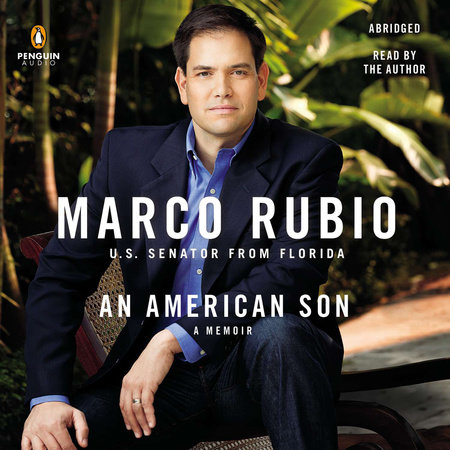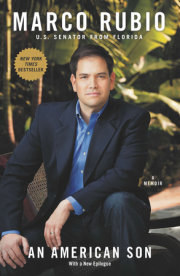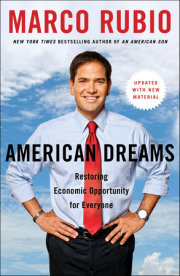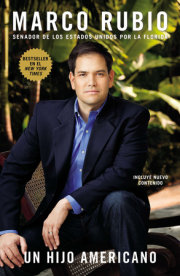Excerpted from An American Son by Marco Rubio by arrangement with Sentinel Penguin, a member of Penguin Group (USA), Inc., Copyright © 2012 by Marco Rubio.
CHAPTER 1
November 2, 2010
“WE’RE CALLING IT FOR YOU.”
At exactly eight p. m. eastern time, Brendan Farrington, an Associated Press reporter, turned to me and spoke those words.
Seconds later, the AP report flashed simultaneously on multiple television screens. Fox News called the election as well, confirming the consensus that I would be the new senator from Florida. After all these years of watching elections, it felt a little surreal to see my name with the words “projected winner” underneath my picture. But there it was right in front of me: “Projected Winner: Marco Rubio.”
The next few minutes were a blur. I shook some hands. I kissed my wife, Jeanette, and was whisked away to a separate room to field phone calls. The entire day— the entire two years of my life before that night—culminated in a flurry of congratulations, handshakes and hugs. In the midst of the celebration, I felt a tug on my jacket and saw my eight- year- old daughter, Daniella, looking up at me. “Daddy, did you win?” she asked. “Yeah, I won,” I answered. “No one told me,” she complained as I bent to hold her in my arms.
My family later told me I had seemed like someone else. The man bounding up the steps to the stage, grinning and waving from the podium, was attentive and expansive. That man, the gregarious public man, didn’t appear in their company very often. He didn’t live at our house.
The husband, father and brother they knew had been a remote figure in their lives over the last two years, a tired and distracted candidate who came home only to seek relief from the pressures of a demanding campaign. The perfect strangers whose votes I hoped to earn, who shook my hand and told me about their lives, got the best part of me. My family got what I had left, which wasn’t much. In the intimacy of family life, I was quiet and withdrawn, and resisted attempts to pull me into conversations about the campaign, although my mind rarely concentrated on anything else.
I had imagined election night many times during the campaign, on good days and harder ones. I had pictured all of it: the people, the place, the sounds, the shared feelings of pride, relief, exhilaration. Even on days when I did not believe it would happen, on a long drive home from a fund- raiser where we had collected a few hundred dollars or after another poll had me thirty points behind the sitting governor of my own party, I would envision this night for encouragement. I would put on my iPod earphones, listen to my guilty pleasure, hip-hop, close my eyes and see it. And here it was, at last, no more vivid in reality than it had been in my imagination.
We were at the Biltmore Hotel in Coral Gables. I had grown up less than two miles from the Mediterranean-style landmark nestled between large banyan trees and lush golf courses. We live a short drive from it today.
The Biltmore had once boasted the world’s largest swimming pool. The hotel had been the tallest structure in Florida when it opened in 1926, and in its long and colorful history it has welcomed as guests royalty and movie stars, politicians and mobsters. A famous gangster had been murdered there.
My high school friends and I had snuck onto the resort’s golf course at night; its gazebos offered the perfect hiding spot for underage beer drinking. When I practiced law, I would meet clients for breakfast or lunch in its ground-floor café. As a city commissioner and later a state legislator, I attended dozens of fund- raisers and other political events in its suites and ballrooms. And in November of 2006, as the incoming speaker of the Florida House, I had waited for election results in there. Jeanette and I had been married two blocks from the Biltmore and had spent our wedding night in a room on the seventh floor. There isn’t another place in the world I would rather have held what I expected would be my victory celebration.
I had good reason to be confident. Every recent public poll confirmed that I held a commanding lead. Our own tracking polls offered as good or better news. The Republican turnout in absentee ballots and early voting had given me a comfortable cushion. But as the day progressed, I couldn’t shake the uneasy feeling the race would be closer than expected and I might end up on the wrong side of a historic upset.
In the open- air courtyard on the west side of the hotel, workers set up an elevated stage and placed a podium in the center, in front of a row of American and Florida state flags. Family, friends, supporters and spectators congregated in the courtyard throughout the afternoon and into the evening. Behind them stood a large riser for television cameras and media crews from around the country and the world, providing an unrestricted view of the podium where I would deliver my speech.
On the ground floor beneath the ballroom, campaign staff gathered in an improvised war room. They stared at laptops and television screens, worked their phones and chatted nervously about the weather and turnout in this or that county.
Around half past six in the evening, my twenty- four-year-old nephew Orlando, or Landy as we call him, picked us up in a rented minivan and drove us to the Biltmore. As soon as we arrived I was briskly escorted to the war room, where aides were still sitting in front of their laptops and holding their phones, waiting for news of final turnout numbers. Numerous televisions sat in the middle of the room tuned to the broadcast and cable networks that would soon begin reporting election results. Most polls in Florida close at seven p. m. eastern time, except in the Panhandle, which is in the central time zone. The polls there close an hour later, so the media refrains from projecting winners until then.
A little before eight o’clock, Brendan Farrington took a phone call. I knew from the look on his face it was important. Over a year earlier, Brendan had traveled with me on a campaign swing through the Panhandle. We were halfway through the first day’s drive when a source called to tell him I was about to drop out of the Senate race.
I had all but convinced myself to quit. I had discussed getting out with several people whose discretion I trusted. I was badly trailing Governor Crist in popular support and fund-raising. Even if I were to get a little traction eventually and start to close the gap in the polls, he would have raised more than enough money to bury me in negative advertising, and I wouldn’t have anywhere near enough to respond. I feared he would so tarnish my reputation that I would have a hard time finding a job after the primary and would never hold another elective office.
I felt trapped. I was bound by a sense of obligation to my supporters, the people who believed in me when no one else did, and I didn’t want to disappoint them. Some of them had risked a great deal when they had crossed a sitting Republican governor by endorsing me. I had received, as had some of my prominent supporters, subtle and not so subtle threats that we were jeopardizing our future by continuing in a hopeless cause. Family and friends urged me to remain in the race. But others assessed the race as I had, as unwinnable, and agreed I should give serious consideration to making my exit. I experienced a feeling I had never had before, a sense that I was incapable of changing my circumstances, that self-reliance wasn’t enough, that my industry, my convictions and my determination couldn’t overcome the challenges I faced.
I had wrestled with my predicament for some time and had nearly reached the point of making the difficult decision to swallow my pride, abandon the reasons that had encouraged me to enter the race and withdraw.
But when Brendan hung up and asked me whether his source was accurate, I got angry.
I felt certain the call had come from someone in Governor Crist’s campaign who decided to disclose the sensitive information to force my hand. They were trying to muscle me out of the race again, and I didn’t like it. I turned to Brendan, and with a firm resolve I did not actually feel, categorically denied I would be dropping out of the race, not now or ever. I crossed the bridge and burned it behind me. There was no way back and no way out but forward.
On election night, as I watched Brendan take another phone call, glance at his watch and frown, I began to feel uneasy. Would the AP report the exit polls showed a much closer race than the polling had predicted? Worse, would they report that Governor Crist was on the verge of pulling off one of the greatest comeback victories in Florida political history?
No, they wouldn’t. After a couple of minutes, Brendan turned to me and delivered his news. They were calling the election for me.
And that was that.
The first call came from former president George W. Bush, who joked I had won despite his brother Jeb’s help. Then came concession calls from my opponents. Congressman Kendrick Meek called first. Our relationship had always been respectful, and during the campaign I came to admire him a great deal. When Crist decided to run as an independent, Meek’s campaign was doomed, and he knew it. He kept plugging away, though, fighting for his convictions and supporters. I often shared with Jeanette that I didn’t know how he found the strength to keep going. Even after I had become the frontrunner, there were days when I felt I didn’t have the energy for another rally, another speech, another fund-raiser. Every poll had Meek in third place. But he had the fortitude and character to persevere to the end.
Governor Crist called next. It’s no secret that ours had been a bitter race, and I was oft en angered by some of the governor’s attacks. He had gotten personal at times and I had taken it personally. But, unexpectedly, I felt empathy for him now.
As our campaign rejoiced in our success, Crist’s camp suffered intense disappointment. I was mindful that only four years earlier he had been elected governor and must have felt the same joy I was experiencing now. And as heady as the experience of an election victory is, I had enough sense to know that fortunes can change quickly in politics. One day I might be on the other end of such a call. Exulting in my opponent’s defeat suddenly seemed an arrogant and foolish temptation.
We had arranged with the Crist and Meek campaigns for their candidates to address their supporters before I addressed mine. The networks would cut away from their remarks the moment we took the stage, and after a long and arduous campaign they deserved to be heard in full. I used the time to sketch an outline of the points I wanted to make in my speech. In the final days of the campaign, I couldn’t bring myself to write a victory speech. I worried I was getting ahead of myself, and might still lose the election. If that happened, I would have wasted valuable campaign time laboring over a speech I would never give. I also felt that, were I to win, my supporters would be so happy with the victory that my speech wouldn’t matter. If I lost, no one would be watching.
A little after nine o’clock, it was time for me to take the stage. Jeanette and our children joined me in the hallway and we proceeded to a holding area next to the walkway that led to the stage. I reached into my wallet and removed a note of encouragement Jeanette had written for me during some of the campaign’s darkest days.
Jeanette didn’t enjoy politics. She had no desire to be a senator’s wife. The life she wanted was the life she had not had as a child. She wanted a father for her children who came home for dinner every night, a husband who left his work behind when he was at home and who shared in the responsibilities of running a household. My political career had deprived her of the settled, predictable family life she longed for. I had never been able to get the balance right between my career and my personal life. When I thought I would lose, the only thought that consoled me was the prospect of giving my family the attention they deserved. Now, as I read her note again, I recognized my election meant a normal life would continue to elude us. It wasn’t fair to her, and I knew it. As I prepared to make my first speech as Florida’s newly elected senator, I was acutely conscious of the great debt I owed her.
Former governor Jeb Bush reached the end of his introduction, and we got the signal to make our way down a roped- off corridor to the stage. Just before we reached it, I spotted a group of senior citizens from a local senior center. I didn’t know any of them personally, but I knew their stories. They were Cuban exiles of my parents’ and grandparents’ generation who had come to this country a decade or more before I was born. The young tend to forget that their parents were once young, too, and had dreams for their lives, dreams that were not so different from our own.
These exiles left their home and came to a foreign place where most would never achieve the dreams of their youth. They lost them to an accident of history. Most believed they would return home someday. They never would. They would accept their loss, and devote themselves to giving their sacrifice a purpose. Their children and grandchildren would never suffer what they had suffered. They would do things their parents could not do. They would live their own dreams in a country that believed in them.
My success and the success of anyone from my generation is deeply personal to them. It affirms that their lives have had purpose and meaning. As they near the end of their lives, they ask themselves the question we all ask in the end: What was it all for? Did we matter? Their children, a generation privileged by their sacrifices, were their answer. Yes, they mattered. Our children are the mark they made in the world.
It took me years to understand this— years of knocking on doors and visiting senior centers, listening to the stories of a generation of exiles, stories of loss and struggle and hope and faith in the promise of their sacrifice. I knew them. I knew what they had given and what they had achieved. I knew the members of my generation were the beneficiaries of their sacrifi ces. I knew how the trauma of exile— disbelief, guilt, a sense of loss— had shaped their lives and my own. I knew that their love born of gratitude for the country that had welcomed them and encouraged their aspirations, and the loss that had brought them here, had made them vigilant in their watch for anything they thought could threaten America and the great promise of freedom that had rescued them.
This is the culture that shaped my youth, and the community that had elected me to the West Miami City Commission and then the state legislature. Politics permeates every aspect of life in Miami’s Cuban American community. It is impossible to be apolitical in a community of exiles. Their passion enveloped me very early in my life, a life that would have turned out very differently without their influence.
My family and I took the stage together. I went up first, with Jeanette and the kids right behind me. I pulled together the notes I had scribbled down and looked up at the press riser. I had been told to expect more than two hundred credentialed members of the press to attend our event, and now I saw the cameras. Every spot on the riser was taken. It was then that it hit me. I was about to speak to the largest audience I had ever addressed in my life.
Through much of the speech I could feel the bustle of the kids behind me. From the corner of my eye, I saw Jeanette holding our squirming three-year- old son, Dominick, who had lost patience with the whole spectacle. At one point he walked up to me, and almost unconsciously I gently pushed him back toward his mother while I continued my speech. It was a metaphor for our life. I was in the spotlight doing my thing, and Jeanette was in the background making it possible for me to do it, dealing with the reality of four small children while I got all the attention and acclaim.
I spoke for less than twenty minutes. The speech was well received by my supporters, but I wasn’t pleased with it. I felt my thoughts had been disjointed and unorganized, and I regretted not saying a few words in Spanish for people watching on the Spanish- language networks. I couldn’t get a feel for what I wanted to say. I wanted people to know I had run because I believed our nation was headed in the wrong direction in a hurry, a direction that would diminish our country if not reversed, and I believed our party had been complicit in this calamity. I entered the race because I didn’t see anyone else running who would do something about it. And I stayed in the race because I believed that if my opponent won he would support the policies that had set us on this disastrous course.
But the campaign had become so much more to me than that— so much more than politics. I had discovered so much about myself, about the people I loved and who loved me, about the community I was raised in, about my country and my faith. I didn’t have the words or time to give voice to all the thoughts that filled my heart and mind that night as I struggled to express my gratitude.
The campaign had tested me, and taught me lessons about myself that I needed to recognize but had not been ready to learn. I learned about my weaknesses and insecurities, my inattentiveness to important details, my impatience with people whose opinions I didn’t share— my flaws had been exposed for all to see and had humbled me. I learned so much about the people who loved me, and the great generosity with which they expressed it. I came to appreciate far better than I had before how everything I have attained in my life has come from the support and sacrifices of others, from my parents, my community, my wife and children, and from the privilege of being an American. And I knew again the presence of the real and living God, who uses everything we want and everything we fear to lead us to Him. A speech cannot give adequate thanks to all that love, to all who made me who I am and who I yet hope to be. This book is my attempt to pay them all belated tribute.
I wasn’t sure where we were supposed to go after I finished my remarks. I turned to Jeanette and asked her, “What do we do now?” Then the confetti cannons went off . Tiny bits of paper started falling from the sky. At one point, so much confetti was falling, I couldn’t see the crowd. The kids loved it. It’s funny how the mind works. All I could think of was how long it would take to clean it all up.
I looked to my left and saw my mother coming up the steps to the stage. She turned eighty that day. My election had brought her joy on her birthday, and I choked up with gratitude. She had once dreamed of becoming an actress, but spent her working life mostly as a maid. Absent from the celebration was my father. He had lost a short battle with lung cancer less than two months earlier. He hadn’t lived long enough to see me elected to the Senate, although he died believing I would be. He had wanted to be a business owner, to be his own boss, but instead had settled for work as a bartender. My parents relinquished their ambitions without resentment to make a comfortable and stable home for their children. They couldn’t give us everything we wanted, but they made certain we had everything we needed. We were children of privilege: secure, happy and loved.
My maternal grandfather, whose dignity and courage and wisdom had been an inspiration to me when I was a boy, was gone, too. It would have meant a great deal to him and my father to have been there. It would also have meant a great deal to me. But I felt their presence, and I will always feel it as I live the life they made possible for me.
Their lives, too, were stories of loss and hope and love. Those stories, the preface to my own, began on a Caribbean island little more than two hundred miles from where I stood that night as a newly elected United States senator with debts to pay.
Copyright © 2012 by Senator Marco Rubio. All rights reserved. No part of this excerpt may be reproduced or reprinted without permission in writing from the publisher.






